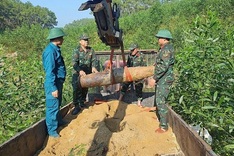Attending and delivering a speech at the discussion session "Rebuilding long-term economic growth" in Davos on Thursday, PM Nguyen Tan Dung shared Vietnam’s successful lessons on sustaining growth and reshaping national competitiveness.
 |
| Vietnamese PM Nguyen Tan Dung delivers his talking points at the World Economic Forum plenary session "Global governance redesigned", Davos, January 28, 2010 |
PM Nguyen Tan Dung remarked that, emerging economies, especially those in Asia, have better conditions to mitigate negative impacts of the global financial crisis and maintain a relatively high growth rate.
He stressed the role of prediction in making policies and securing long-term growth. It is necessary to sharpen forecast and evaluation capabilities in order to map out sound solutions and flexible decisions.
The Vietnamese PM also underlined the importance of social consensus in mobilizing resources for the implementation of policies. Analyzing Vietnam’s experience of coping with the crisis, PM Dung asserted that, while stabilizing macro-economic balances and overcoming short-term challenges, it is essential to guarantee long-term growth and development through policies on infrastructure development and human resource nurturing.
In the post-crisis period, said PM Dung, Vietnam is realizing some priority policies, notably (i) creasing breakthroughs in building the market economy, transforming State-run enterprises, and conducting administrative reforms; (ii) restructuring the national economy toward higher quality, efficiency and competitiveness through upgrading infrastructure, prioritizing hi-tech and environmentally-friendly industries; and (iii) developing human resource and technology.
REMARKS BY H.E. MR. NGUYEN TAN DUNG, PRIME MINISTER OF At the discussion lunch “Rebuilding Long-Term Economic Growth” Davos, January 28, 2010 The recent global economic and financial crisis has put negative impacts on almost most of countries worldwide and caused serious damages for the global economy. However, it also gives us valuable lessons and experience. Already surviving the Asia financial crisis 1997-1998 and heavily affected by the recent global crisis, Vietnam has spared no effort to take consistent and proper measures, so as to prevent economic downturn. In 2009, Vietnam managed to rank itself among several countries with a relatively high growth rate, standing at 5.32%. We would like to share some of our experience of securing growth and sustainable development as follows: First, the global economic and financial crisis revealed our weaknesses in monitoring, predicting and warning possible crises. Prediction plays a very important role in making policies and guaranteeing long-term growth. Thus, in the time to come, we should pay greater attention to and spend bigger resources on this work at national, regional and global levels; Second, it is necessary to secure macro-economic stability, major balances of the national economy and safety of the banking system. At the same time, we should adopt sound fiscal and monetary policies in line with market rules while bringing into play the State management in order to correct the market’s shortcomings; Third, each country has its own socio-economic conditions. Therefore, solutions to cope with the crisis and prevent economic recession should be designed in conformity with actual conditions of each country; As a developing country having a not-so-well socio-economic infrastructure and a potential domestic market, Vietnam has, apart from its solutions to promote production, business and export, focused resources on realizing infrastructure projects, especially transport, energy, irrigation, health, and education; and developing domestic market, particularly in rural areas. Vietnam has responded to the global economic and financial crisis in such a context which is quite different from other countries in the world – its inflation rate and benchmark interest rate standing high. So, we have slashed interest rates down to reasonable rates and provided interest rate subsidies, credit guarantee, tax exemptions, reductions and delays to various beneficiaries in different sectors. Fourth, poor countries, people and rural areas are most severely affected by the crisis. Bearing this in mind, in Vietnam, while mapping out solutions to stimulate economic growth and secure macro-economic stability, we have paid a special attention to social welfare and security as well as given supports to agricultural and rural areas; Fifth, whenever identifying proper targets and solutions, we have drastically put them into reality while promoting information work in order to bring about a high social consensus and exploit the country’s aggregate strength. Nowadays, everything is changing rapidly, thus we should closely monitor and update analyses and evaluations in order to make timely re-adjustments; Sixth, in the era of vigorous globalization, it is each country’s effort to cope with the crisis. At the same time, it is essential to enhance international cooperation as a way to mobilize all resources and join actions on both regional and global scales. Together with solutions of settling down the crisis and reversing economic downturn, the Government of Vietnam is promptly creating preconditions for rapid and sustainable growth in the post-crisis period and the following years. This process is also aimed at sharpening national competitiveness, with the following focuses: (1) perfect the market economic regime; create a fair playground for all economic sectors and a healthy environment for production and business activities; boost up international economic integration and increase its efficiency; (2) mobilize different resources to build up integrated and modern infrastructure, especially transport, urban infrastructure, energy, health, education, and irrigation; (3) nurture highly-qualified human resource; and promote the application of scientific and technological advances; (4) speed up national administrative reforms, simplify administrative procedures, and improve State management; (5) restructure the national economy, service and production industries, and enterprises; shift the model of growth to in-depth development on the basis of science, technology high-skilled labor force, and modern management; increase validity and competitiveness of domestic products, business community and the entire economy; (6) enhance environment protection, combat with climate change, natural calamities and epidemics. Thank you very much. |




















